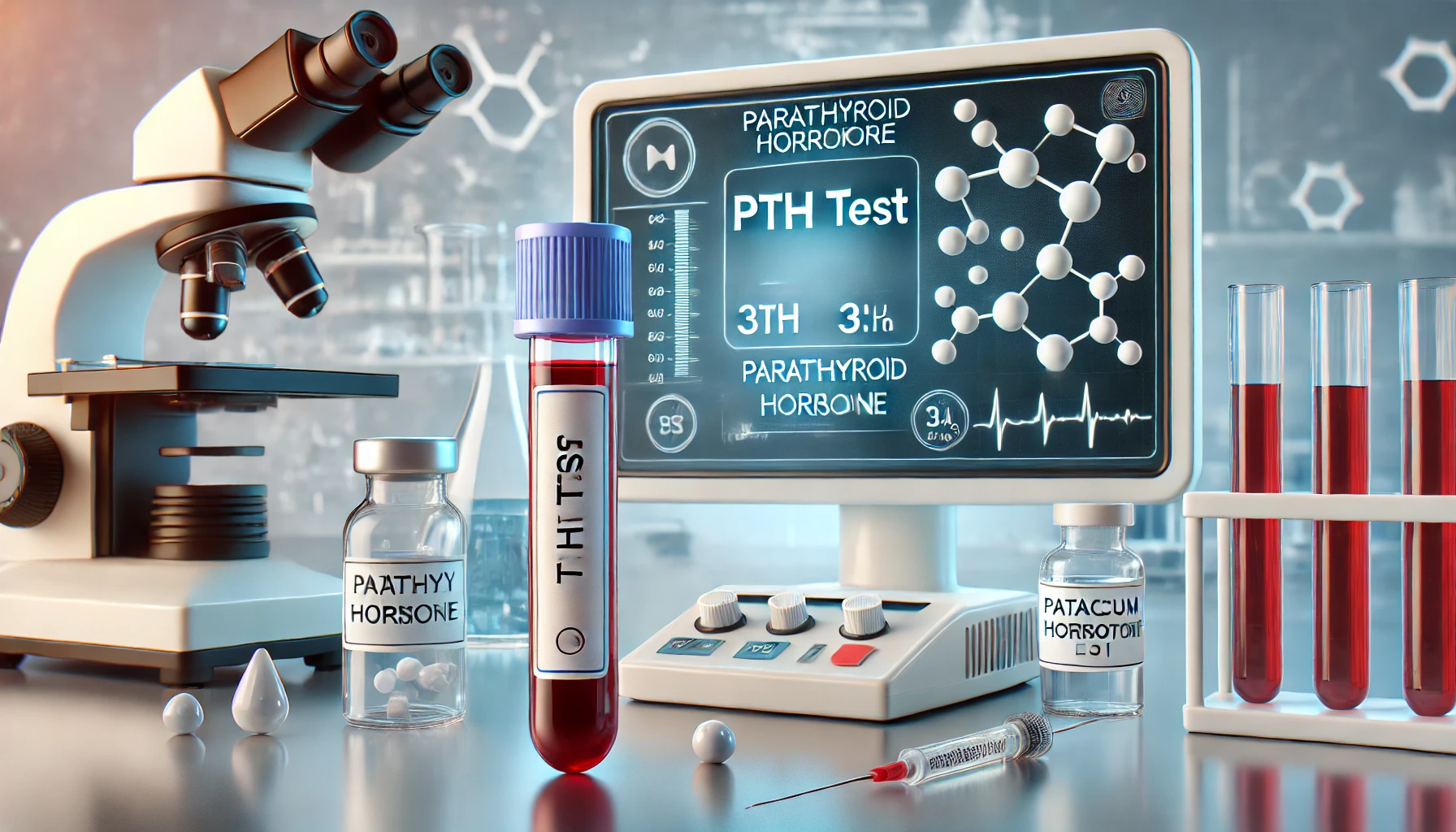Table of Contents
Parathyroid Hormone (PTH) Test
 A detailed view of a PTH test tube in a modern medical laboratory, highlighting its role in diagnosing calcium imbalances.
A detailed view of a PTH test tube in a modern medical laboratory, highlighting its role in diagnosing calcium imbalances.
The Parathyroid Hormone (PTH) Test measures the levels of parathyroid hormone in the blood. PTH is crucial in regulating calcium, phosphorus, and vitamin D levels in the body. The test is commonly ordered to diagnose, monitor, or assess conditions related to calcium imbalances, such as:
- Hyperparathyroidism (overactive parathyroid glands)
- Hypoparathyroidism (underactive parathyroid glands)
- Chronic kidney disease (CKD)
- Osteoporosis and metabolic bone disorders
- Calcium metabolism disorders
Function of PTH in the Human Body
PTH is secreted by the parathyroid glands, which are four small glands located behind the thyroid in the neck. The hormone plays a crucial role in:
- Regulating Calcium Levels: PTH increases blood calcium levels by stimulating calcium release from bones, increasing calcium absorption in the intestines, and reducing calcium excretion by the kidneys.
- Phosphate Regulation: PTH reduces phosphate reabsorption in the kidneys, helping to balance phosphate and calcium levels.
- Vitamin D Activation: PTH enhances the conversion of vitamin D to its active form (calcitriol), which aids calcium absorption in the intestines.
Why is the PTH Test Used in Medical Laboratories?
This test is essential in diagnosing and managing several diseases, including:
- Primary Hyperparathyroidism: Elevated PTH due to abnormal gland function.
- Secondary Hyperparathyroidism: Increased PTH due to conditions like chronic kidney disease or vitamin D deficiency.
- Hypoparathyroidism: Low PTH, leading to calcium deficiency and muscle cramps.
- Osteoporosis and Bone Disorders: To determine if abnormal calcium levels are linked to parathyroid dysfunction.
- Kidney Disease: Evaluating PTH levels in CKD patients to prevent bone and mineral disorders.
Reasons for Ordering the Test
A healthcare provider may recommend a PTH test for individuals experiencing:
- High or low blood calcium levels detected in routine tests
- Bone pain or fractures
- Muscle cramps, weakness, or tingling sensations
- Chronic kidney disease (CKD)
- Symptoms of vitamin D deficiency
- Kidney stones
- Unexplained fatigue or depression
Test Procedure and Method
- Sample Type: A blood sample is required.
- Collection Process: A healthcare professional draws blood from a vein, usually from the arm.
- Laboratory Analysis: The sample is analyzed using immunoassay techniques to measure PTH levels.
Preparation and Guidelines
- Fasting: Some providers may request fasting for 8–12 hours before the test.
- Medication Adjustments: Certain medications (e.g., calcium supplements, vitamin D, steroids, diuretics) may need to be paused before testing.
- Avoidance of Certain Activities: Strenuous exercise before testing may affect results.
Interpreting Results
Reference Ranges (may vary by laboratory):
- Normal PTH Levels: 10–65 pg/mL (picograms per milliliter)
- High PTH Levels may indicate:
- Primary or secondary hyperparathyroidism
- Chronic kidney disease
- Vitamin D deficiency
- Malabsorption syndromes (e.g., celiac disease)
- Low PTH Levels may indicate:
- Hypoparathyroidism
- High calcium levels due to malignancy or excess calcium intake
- Autoimmune conditions affecting the parathyroid glands
Clinical Implications and Next Steps
- High PTH Levels: Further evaluation may include calcium, phosphate, vitamin D tests, and imaging of the parathyroid glands.
- Low PTH Levels: Requires assessment for calcium disorders, autoimmune diseases, or surgical complications (e.g., post-thyroidectomy hypoparathyroidism).
- Treatment: May involve medications, calcium and vitamin D supplements, or surgery for abnormal parathyroid gland function.
Frequently Asked Questions
- Is the PTH test accurate?
- Yes, it is highly reliable when performed in accredited laboratories.
- Are there any risks associated with the test?
- Minimal risks, such as slight pain or bruising at the blood draw site.
- How long do results take?
- Typically within 24–48 hours.
- What should I do after receiving abnormal PTH results?
- Consult a healthcare provider for further evaluation and potential treatment.
Final Thoughts and Recommendations
The PTH test is a crucial diagnostic tool for evaluating calcium imbalances and parathyroid function. Discussing results with a healthcare provider ensures appropriate diagnosis, treatment, and follow-up. Additional tests, such as calcium, phosphate, and vitamin D levels, may be recommended for a comprehensive assessment.
Related Tests
- Serum Calcium Test: Evaluates calcium levels in the blood.
- Phosphate Test: Assesses phosphate levels, important for bone health.
- Vitamin D Test: Determines vitamin D status, which affects calcium absorption.
- Ionized Calcium Test: Measures the bioavailable calcium in the blood.
- Bone Density Test (DEXA scan): Assesses bone mineral density for osteoporosis.
- Kidney Function Tests (Creatinine, GFR): Evaluates kidney health in relation to calcium and PTH regulation.
By ensuring proper testing and interpretation, healthcare providers can develop effective treatment plans to maintain optimal calcium balance and overall health.
